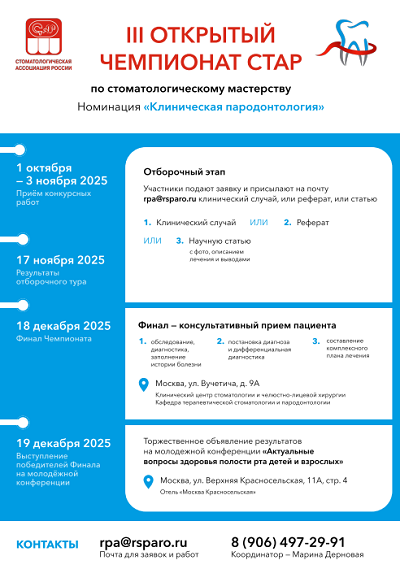Functional assessment of microcirculation in the injection site tissues when using local anaesthesia
https://doi.org/10.33925/1683-3759-2024-929
Abstract
Relevance. In modern dentistry, the primary criteria for successful anaesthesia are the effectiveness and safety of the anaesthetic used. These factors depend on the type of local anaesthetic and the method of its administration in the maxillofacial tissues. Studying the impact of locally anaesthetizing solutions administered by different injection techniques on the periodontal tissues is possible by recording changes in microcirculation using the LDF method.
Purpose. To dynamically record the baseline microcirculation indicator in the tissues at the injection site when using various methods and means of local anaesthesia.
Materials and methods. The study of changes in the microcirculation of periodontal tissues was conducted among 105 patients: 67 women and 38 men aged 25 to 56 years without periodontal pathology and comorbidities, using injection methods of anaesthesia (infiltration and modified periodontal anaesthesia) with 2% and 4% solutions of articaine with varying concentrations of vasoconstrictor. Changes in the microcirculation index were recorded at the injection site: at the root apex projection during infiltration and in the gingival papilla region during MPA, with an exposure time during LDF registration of 5 minutes. To maintain the fiber optic probe, an individual key made of C-silicone with an additional corrective layer was used for repeat positioning. The most informative indicator of the study was the magnitude of the average blood perfusion flow (M) in the time interval of registration, with its changes reflected in the study results.
Results. Analysis of the dynamics of microcirculation indicators in the injection site tissues when using various methods of administering locally anaesthetizing drugs based on 2% and 4% solutions of articaine without vasoconstrictor and with epinephrine at concentrations of 1:200,000 and 1:100,000 allowed the determination of tissue ischemia depth at the injection site and the rate of blood flow restoration after anaesthesia.
Conclusion. Changes in microcirculation indicators in the tissues at the injection site of the local anaesthetic depend on the concentration of the local anaesthetic and vasoconstrictor, the method of administration used, and the volume of the drug administered.
About the Authors
E. N. AnisimovaRussian Federation
Evgenia N. Anisimova, DMD, PhD, Associate Professor, Department of Dentistry and Maxillofacial Surgery
Moscow
N. U. Anisimova
Russian Federation
Natalia Yu. Anisimova, DMD, PhD, Associate Professor, Department of Local Anesthesia
Moscow
I. V. Orekhova
Russian Federation
Irina V. Orekhova, DMD, PhD, Associate Professor, Department of Dentistry and Maxillofacial Surgery
Moscow
L. V. Pershina
Russian Federation
Lubov V. Pershina, DMD, PhD, Associate Professor, Department of Dentistry and Maxillofacial Surgery
Moscow
References
1. Anisimova NY, Anisimova EN, Ryazantcev NA, Kravchenko IA. Comparative analysis of 2% and 4% articaine solution efficacy and safety for the local anesthesia. Stomatology. 2021;100(5):25-29 (In Russ.). doi:10.17116/stomat202110005125
2. Anisimova EN, Ermolev SN, Pershina LV, Letunova NU, Orekhova IV, Ryzancev NA, et al. The method of periodontal anesthesia during dental treatment. The Dental Institute. 2017;(3):38-40 (In Russ). Available from: https://instom.spb.ru/catalog/article/10945/
3. Berlin J, Nusstein J, Reader A, Beck M, Weaver J. Efficacy of articaine and lidocaine in a primary intraligamentary injection administered with a computer-controlled local anesthetic delivery system. Oral Surg Oral Med Oral Pathol Oral Radiol Endod. 2005;99(3):361-6. doi: 10.1016/j.tripleo.2004.11.009
4. Hintze A, Paessler L. Comparative investigations on the efficacy of articaine 4% (epinephrine 1:200,000) and articaine 2% (epinephrine 1:200,000) in local infiltration anaesthesia in dentistry a randomised double-blind study. Clinical Oral Investigation. 2006;10(2):145-150. doi: 10.1007/s00784-005-0025-0
5. Brickhouse TH, Unkel JH, Webb MD, Best AiM, Hollowell R. Articaine use in children among dental practitioners. Pediatric Dentistry. 2007;30(6): 516-521. Available from: https://www.researchgate.net/publication/23970919_Articaine_Use_in_Children_Among_Dental_Practitioners
6. Elheeny AAH. Articaine efficacy and safety in young children below the age of four years: An equivalent parallel randomized control trial. Int J Paediatr Dent. 2020;30(5):547-555. doi: 10.1111/ipd.12640
7. Kämmerer PW, Krämer N, Esch J, Pfau H, Uhlemann U, Piehlmeier L, Daubländer M. Epinephrine-reduced articaine solution (1:400,000) in paediatric dentistry: a multicentre non-interventional clinical trial. Eur Arch Paediatr Dent. 2013;14(2):89-95. doi: 10.1007/s40368-013-0024-9.
8. Kämmerer PW, Schneider D, Palarie V, Schiegnitz E, Daubländer M. Comparison of anesthetic efficacy of 2 and 4 % articaine in inferior alveolar nerve block for tooth extraction-a double-blinded randomized clinical trial. Clin Oral Investig. 2017;21(1):397-403. doi: 10.1007/s00784-016-1804-5
9. Rathi NV, Khatri AA, Agrawal AG, M SB, Thosar NR, Deolia SG. Anesthetic Efficacy of Buccal Infiltration Articaine versus Lidocaine for Extraction of Primary Molar Teeth. Anesth Prog. 2019;66(1):3-7. doi: 10.2344/anpr-65-04-02
10. Flanagan DF. The effectiveness of articaine in mandibular facial infiltrations. Local Reg Anesth. 2015;9:1-6. doi: 10.2147/LRA.S94647
11. Meechan JG. The use of the mandibular infiltration anesthetic technique in adults. J Am Dent Assoc. 2011;142 Suppl 3:19S-24S. doi: 10.14219/jada.archive.2011.0343.
12. Mittal M, Sharma S, Kumar.A, Chopra R, Srivastava D. Comparison of Anesthetic Efficacy of Articaine and Lidocaine During Primary Maxillary Molar Extractions in Children. Pediatric Dentistry. 2015;37(7):520-524. Available from: https://www.researchgate.net/publication/292447939_Comparison_of_Anesthetic_Efficacy_of_Articaine_and_Lidocaine_During_Primary_Maxillary_Molar_Extractions_in_Children#fullTextFileContent
13. Scardina GA, Pisano T, Cacioppo A, Messina P. Periodontal alteration of the microcirculation and hypercholesterolemia: a possible correlation? South Med J. 2011;104(2):116-20. doi: 10.1097/SMJ.0b013e318205ddf1
Supplementary files
Review
For citations:
Anisimova EN, Anisimova NU, Orekhova IV, Pershina LV. Functional assessment of microcirculation in the injection site tissues when using local anaesthesia. Parodontologiya. 2024;29(2):179-186. (In Russ.) https://doi.org/10.33925/1683-3759-2024-929



































